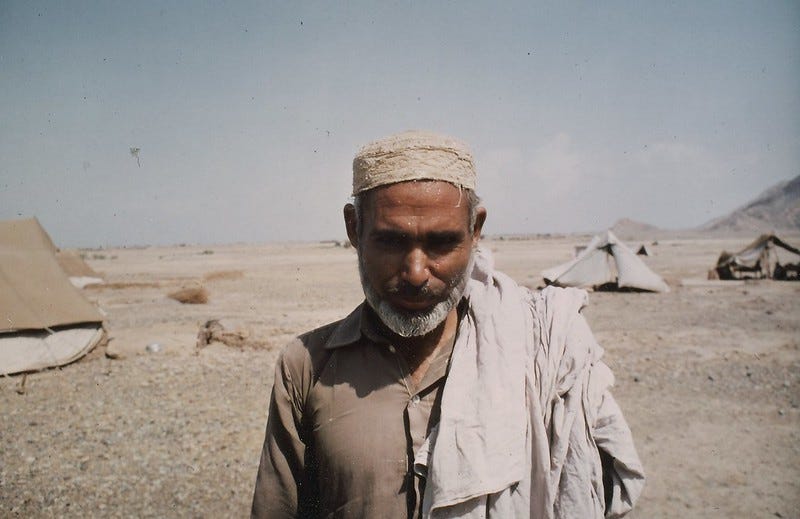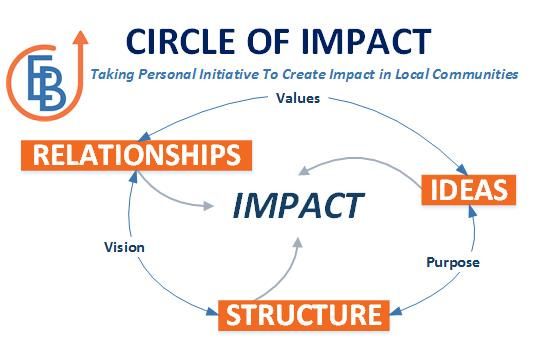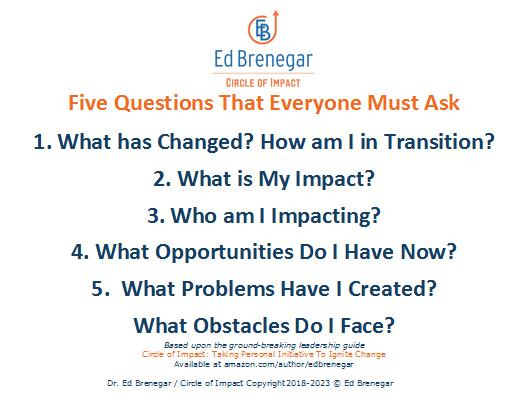The Spectacle of Control
Change is upon us. It is not what you think that matters. It is what you do.
Let me begin this post with two statements. If you read nothing else, these should be points of reflection during this age of disruption.
Your opinion does not matter. It is what you do that does.
Everyone has opinions. The Spectacle of the Real is nothing but opinions. We grant them authority for reasons that make no sense. Why do we listen to people who only have opinions to offer the world? Why?
It is easy to be a critic.
It is hard to be a person who believes that they can make a difference in the world
and actually do it.
The Spectacle of the Real is the culture of opinion and criticism. Taking initiative to create impact that makes a difference that matters is a culture of hope and impact.
Oh, how wonderful it would be if this is all you needed to know!
The Spectacle of Control
The reality that confronts us when we rise in the morning is the illusion of control. We cannot grasp that the human control of all the variables of life is an illusion. The philosophies of the past few centuries have convinced us that everything originates in our minds. “I THINK, therefore I AM.” In other words, we think, and we create the world of our choosing.
Reality is far different.
We see a landscape. We become aware of change. We are conscious that something is happening that defies description. We respond to what exists.
As we embrace reality,
we entered into a relationship of awareness and respect, engagement and
realization of opportunities for action.
Reality shows us that the sun rises and the sun sets without our determination. We only perceive it as rising and setting. We order our day by the transition from daylight to night and back again. Time forces itself on us. We respond. We count the days until vacation or retirement.
Our bodies wear out. Our machines need repair. Our minds change as we address the complexity of reality.
Even with the most egregious forms of climate control, the climate is not under our control. We cannot build walls to hold back change.
We do not have absolute control over anything that exists. We exist in a relationship with reality. If we do not respect it, we will be overwhelmed by it. Our egos keep telling us that we are in control as we manufacture spectacles and machines to convince ourselves of our invincibility.
Social media is designed as a platform for opinion and spectacle.
Influence is the goal.
What is influence? Numbers watching and buying.
It isn’t a relationship platform, but a consumer platform. We are forced to accommodate our relationships to a consumer mindset. Everything is ordered by the transactional nature of it. We as human beings were not created to be engines of consumption.
What are we consuming? Time. Opinion. Influence.
To what end do we consume social media? Is it to fix our sense of identity in the broader world?
The system is designed for mass conformity. The modern world focuses on this simple purpose of living through consumption. The modern world is a one-size-fits-all system of ideas, products, and social environments.
We are trained to think by absorbing other people’s opinions as our own. We absorb the images and opinions created by AI as the mediating medium of our relationships.
What is the impact of this culture of opinion and spectacle?
What changes because of the influence of opinion?
Look around. Observe human behavior. How are human beings using their time?
Recognizing this reality, I wrote The Spectacle of the Real.
Fueled by a 24/7 news cycle, actual news - a statement of "facts" that an event, an accident, a death, an agreement, a visit or something has taken place, described in the traditional journalistic parlance of "who, what, when and where" - is transformed into a spectacle of opinion and virtual reality driven by the images of faces speaking words of crisis, fear, and self-righteous anger. Televised analysis - more important than the "facts" of the story - drives the news through the ambiguity of the visual image and is its source of validation.
Imagine a gathering with family and friends, catching up on the news of each other's lives, and the conversation is like the panels of "experts" who fill televised news each day. No one intentionally chooses their backyard barbeque guests to mirror the political divisions of the nation. That would be boring, tedious, and just inhospitable and unwelcoming.
These televised events aren't conversations seeking truth, but, rather, people talking at and past one another in a game of leveraging images for social and political influence. We are drawn to the image on the screen of these "experts" having something to say that is meaningful, hoping that at some point some sense of the moment will be revealed, bringing reality into view.
The Illusion of Control
The world is now in a state of dramatic reconfiguration. Where it ends, no one really knows. The opinion makers are very poor at predicting the future.
The effect of President Donald Trump’s disruption of the world’s globalist status quo reveals both the fluidity and fragility of our world.
Change can happen very quickly. Nothing is fixed. Nothing is certain. Change can be positive or negative as defined in the moment.
How interesting it is to watch world leaders respond to Trump’s presidential art of the deal. Our leaders reveal their own illusion of control. It is instructive about the real nature of the world we are living in. World leaders are in control to the degree that we accept their influence over us.
Public opinion of Donald Trump and the Globalists doesn’t really matter. They aren’t responding to us. We are responding to them. They are leveraging influence to control us. I am not interested in opinions that do not lead to action. I am very interested in what people do because of the opinions that influence their behavior.
We can’t outthink experience.
If you live in your head, then you are susceptible to social media influence (See The Spectacle of the Real). Do our words create reality, or do words provide us a way to articulate what we experience in reality? Is our choice between experience and opinion as what constitutes reality?
Of course, reality is somewhere in the middle. We can lie to ourselves about what we believe is true and what we have experienced as true. Or, we can accept that we see and experience only partially. We never fully grasp reality’s impact upon us.
The middle ground, therefore, is found by questioning our thought processes and the experiences that happen to us. Nothing is absolute. There is always middle ground.
There is a difference between a story concocted to hide our weakness or failure and the experience of doing something that makes a difference that matters.
What we do or don’t do matters more than what our opinion is.
This is the difference between reality and simulation. The difference is between recognizing generational memory as the heart of the continuity of time and living in The Eternal Present where there is no past or future.
Our stories either lead us to a legacy of impact or to the illusion of control.
In my podcast interview with Megan Miller (scheduled for release September 11), we talk about cross-cultural communication. For many non-Western cultures, the key to establishing rapport is demonstrating respect and integrity. I learned this from this Afghan refugee.
Serving as a refugee worker in Pakistan, we delivered food, shelter, and clothing to this man’s tribal group living in the desert in Western Pakistan. As we were preparing to leave, he came up to me. Took both my hands in his, shook them, and then stroked my beard.
We had no common language, except the physical representation of respect, honor, and gratitude. He had no opinion to express except gratitude. It was a life-changing moment for me. Empty statements of opinion carry very little importance as a result.
Too often, communication between Westerners is an attempt to impress by having influential opinions. What is that? It is an opinion that ends discussion.
One of the effects of Iain McGilchrist’s work is the recognition that right-brain embodied knowledge is more comprehensive than left-brain abstract, analytical thought. Yet, the language of experience still runs second to the abstract articulation of experience. In effect, the idea of embodied knowledge has appeal, but the appreciation of the actual experience of embodied knowledge lags behind.
Clever, isn’t it? We can embrace experience without it impacting us because it is always subject to left-brain opinion,
Why is this? It is because so much of our communication is made through social media mechanisms. As a podcaster, a great challenge is creating a genuine engagement between me and my guest.
For this reason, the arguments pro or con for Trump or the Globalists have yet to rise above opinion. They get lost in debates about misinformation or disinformation. Political positions are advocated and defended whose purpose is simple. This is how mass control of a population is now accomplished.
For this reason, we are not prepared for the changes that are coming to our world. Even fixation on AI distracts us from the fundamental changes that need to be made in organizations, communities, and nations.
In my podcast conversation with Guido Palazzo, co-author of The Dark Pattern: The Hidden Dynamics of Corporate Scandals, we discuss the question of ethical blindness. As I have observed leaders and organizations over the past half-century, I see how resistance to change in the Structure of an organization was a pattern of behavior that weakened most of them. It made them less resilient, adaptable, and viable in a transformed social landscape. In those situations, I’d make the distinction between a person who knew how to run a business, and one who knew how to lead a business. The difference was always easy to see.
Based on my Circle of Impact model, clarity of thought and establishing respectful, trustworthy relationships were not priorities. They are subsidiary to the Structure of the organization.
Our conformity to the demands of society and institutions makes us complicit. Have you ever noticed how improvement programs are designed to be applied within the established Structure of an organization? Why is there little attention to changing the Structure itself? This recognition led me to see how The Spectacle of the Real defines the public culture of the 21st century.
When I describe leadership as taking personal initiative to create impact that makes a difference that matters, I am implying that influence is a poor substitute for impact.
Why do we view entrepreneurs as exceptional instead of the standard to be followed?
This time of transition, instituted by Donald Trump, presents an opportunity to change not only how we think, but more importantly, what we do. This transition is greater than any one movement. It doesn’t require you to take sides. It does require you to decide to do something in response.
For this reason, we need to change how we think so we can change what we do.
Opinion-making produces reductive rationalization and cleverness in order to control the terms of discussion.
The problem with the current crisis is that you can’t think yourself through it to a compromise with either side. It is change or be changed. To change is a constant, embodied agent response to what is in front of us.
Mark McGrath writes about the need for Re-Orientation. Following from the thought of John Boyd, he shows that it is not just that we need to OBSERVE what is taking place, but that we need to RE-ORIENT our perspective to change how we live in response to what we see. In effect, we need to move from having a simple opinion of what we observe to adopting behaviors and practices that Re-Orient how we live.
What does this look like? It is both simple and hard.
Simple in that we are observant. We don’t discount what we see. We critically look at situations to try to understand what we see. We don’t personalize what we see. It isn’t about me or you or us. It is about achieving clarity of perspective.
The Hard part is changing. This is the reorientation that Mark McGrath describes. We may find the change that is necessary for us to make requires us to walk away from relationships that we have had for a long time. We recognize that they are no longer healthy for us.
This is what I write about in my short book, May Your No Be A Yes: A Guide to Making Better Decisions. We must be clear about what we believe and value. When we are, we can say No to situations where the social pressure to conform is great.
The media treats the Trump/Globalist conflict like two sides of a football match in a winner-take-all game. They have already decided who should be the winner. The stakes are high, and the spectacle nature of the game means the pitch is not level, the officials are biased, and the spectacle that surrounds the game is more important than the match itself.
Think To Change, Not Remain The Same.
The changes we are experiencing now, I saw coming a quarter of a century ago.
How did I see it then, when no one else did? Other people did see it, but treated it as, “Well, this is just the way things are.” This is Guido Palazzo’s ethical blindness in action.
It is easy to fall into line, do what you are told, and become party to the decline. Being complicit does not come from dramatic, late-night wrestling with God decisions. It happens one little thought at a time. It is how we are programmed and socialized into the modern machine of the world.
Forty years ago, when I first became interested in leadership, almost immediately, I knew that my perspective of leadership was antithetical to the way organizations were organized. I rejected all the binary choices that force us to choose sides. Instead, I saw a more complex picture with people at the center of organizations. The world of business was not headed in that direction.
What did I see?
The elevation of the egos of the few as the agency of the many was diminished.
One version of this move is Jack Welch’s financialization strategy, where every aspect of a business’s life is reduced to shareholder return. It is like a mining operation extracting value out of the ground, without replacing or recultivating the land for the future.
In other words, the world has operated under a principle of time that I call The Eternal Present. This perspective can be described this way.
There is no Past. Nor Future. Only the Now.
Everything that once was in time has vanished into simulation.
In other words, we live in a nihilist vacuum. What else does it mean that in the future, “You will own nothing and be happy.”? Is that your opinion about what you want?
If you overthink this situation, you will become a pessimist. However, if you step back and look for the big picture, you’ll realize that these two competing representations of the future are fragile and dependent on the complicity of the public.
The core problems are philosophical and structural. I wrote about this early in this decade in two short books:
Seeing Below The Surface of Things: The Brokenness of the Modern Organization
Where Did Trust Go?: Restoring Authority and Accountability in Organizations
Nothing has changed in my thinking from what I saw forty years ago, twenty-five years ago, or five years ago. It is all a matter of the degree of decline.
The growing complexity of society makes it very problematic for any technical solution to be viable. Complexity does not benefit systems that are designed for control. People are far more adaptive than technology. We have to be ready to face the crisis before us.
Your opinion doesn’t matter. Your action plan does.
Change Before You Are Forced To Change
Do not fall into a pattern of behavior of nihilistic self-pity. Do not let fear, anxiety, or the loss of belief in your own capacity to change be the result of the influence of others.
The Spectacle of the Real programs you to …
Be afraid and confused about what to believe and what to do.
The result is a suspension of belief in the value and importance of your own actions.
The greatest gift that you can give to your team, your family, and your community right now, is the capacity to ask questions in an open, respectful, conversational way. Conversation is the context of shared action.
I also know that people do not know how to ask questions that lead quickly to decisions and actions.
I developed the Five Questions That Everyone Must Ask as one way to order thought processes leading to action.
I have developed another set of five questions that I will post on soon.
Until then, ask this simple question,
If I live the rest of my life creating impact,
what will future generations say that impact has meant?
Think of your life creating the generational memory that your grandchildren and great-grandchildren will speak of as the inspiration and example to follow for future generations.
Your opinions will not matter tomorrow.
Your actions will matter for all of time if you so wish it to be.
It is your choice.






Profound and impactful(!) Opinion drains where impact nourishes. Quietly serving others & nature - now that’s purpose.
Very thought provoking piece Ed. I love the perspective you take.